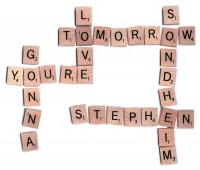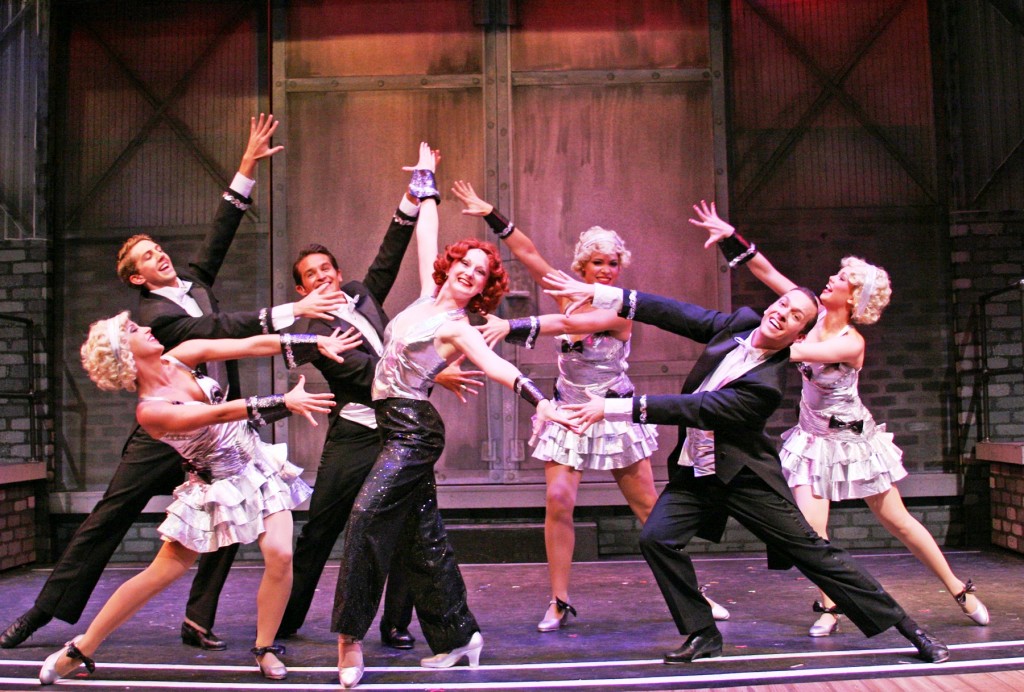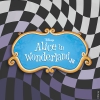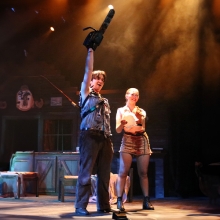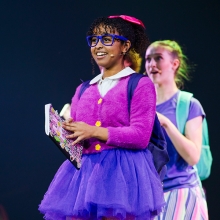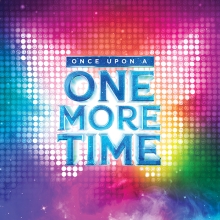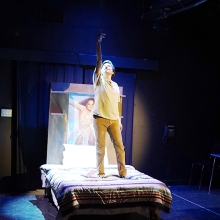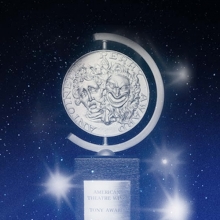During the summer, MTI's office will close at 3 PM ET on Fridays. On Friday, August 30th, the office will close at 1 PM ET for the Labor Day holiday weekend.
Filichia Features: You Just Might Like You're Gonna Love Tomorrow
Filichia Features: You Just Might Like You're Gonna Love Tomorrow
You’ve produced every one of the musicals that Stephen Sondheim has written. As a result, you’ve educated your audiences to know what to expect from the 20th century’s greatest musical theater composer-lyricist: the unexpected.
You're Gonna Love Tomorrow is a good piece for you to do if theaters in neighboring towns have recently done Side By Side By Sondheim or Putting It Together. Here’s an underexposed Sondheim revue, for it only played two performances in New York.
That figure suggests that the show was a terrible bomb. Hardly: both performances on March 3, 1983 were swanky, sold-out affairs at Sotheby's Parke-Bernet Gallery. Four-time Tony-winner Angela Lansbury and future two-time Tony-winners George Hearn and Judy Kaye were in the cast.
But the main event, of course, was the songwriter, which explains why the show was then called A Stephen Sondheim Evening. Several of his songs that even the New York intelligentsia and sophisticates didn’t yet know were included. There were three alone from Saturday Night, his first in-earnest Broadway-bound musical which in 1983 had not yet been produced. Also represented were not-so-frequently heard songs from Sondheim’s hits (“Pretty Little Picture” from A Funny Thing Happened On The Way To The Forum) and frequently heard songs from his not-quite hits (“Not a Day Goes By” from Merrily We Roll Along).
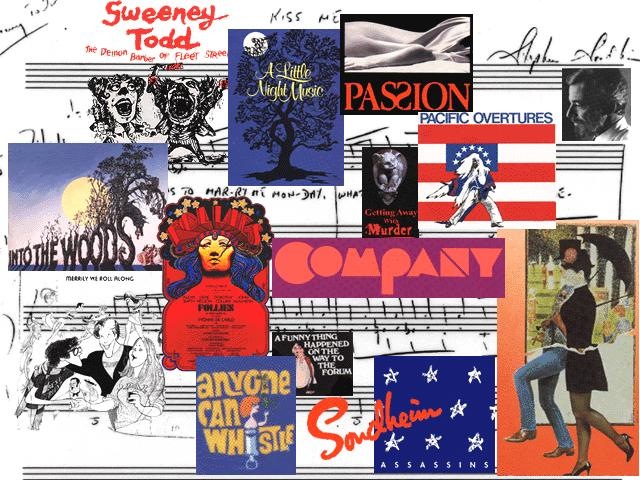
The pair of performances went so splendidly that producer-director Paul Lazarus didn’t see why the show had to be retired then and there. Why not publish it as a revue? Lazarus decided that a new life for the concert meant that it deserved a new title: You're Gonna Love Tomorrow. If Lazarus knew then what he knows now, he might have called it Finishing the Hat, for it covers the same territory as Sondheim’s 2010 first volume of lyrics – from Saturday Night through Merrily.
But not every show with Sondheim’s name on it from 1954 through 1981 is represented. With due respect to such sterling Sondheim collaborators as Leonard Bernstein, Richard Rodgers and Jule Styne, this is an all-Sondheim-lyrics-and-music Sondheim revue. All right, there is one exception: Shakespeare provided 12 lines from Cymbeline, which Sondheim appropriated for his 1974 work, The Frogs.
It’s not an expensive show to do. Street clothes will serve, although you will need some Japanese garb for the Pacific Overtures sections and a few suggestions of Roman wear and scanty outfits for the courtesans for Forum sequences. There are helpful Cliff notes-like renditions of both plots to help those who don’t know Pacific Overtures from South Pacific or Funny Thing from Funny Girl.
I attended You're Gonna Love Tomorrow last week at the Bickford Theatre in Morris Township, New Jersey. A full decade before Putting It Together began with “Invocation” – originally earmarked to open Forum – Lazarus had that idea. The Jersey audience gurgled with pleasure at the good jokes on how to behave at a show, even down to a plea that none should pass gas. (Everyone thinks that Roseanne Barr was the first to mention gas expulsions in that notorious 1989 episode of Roseanne. No, Sondheim did it decades before. As he said to me in 1983, “Vulgar is not a dirty word.”)
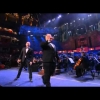
Many of us first heard “Invocation” in May, 1974 when it opened The Frogs at Yale. Most of us who had bought our $5 tickets complained that we couldn’t understand most of the words. No wonder: the show was produced in the building that housed the university’s swimming pool, where the acoustics were terrible. Here at the Bickford, the cast of six (all right, amplified by cheek mics) were able tomake each word perfectly heard. So will your cast in your theater.
Although the show was designed for four men and three women, director Eric Hafen got by with three of each sex. No matter which route you choose, you will have to include some cross-dressing for “The House of Marcus Lycus,” the song from Forum in which the procurer displays his wares. Considering that he must get through such beauties as Tintinabula, Panacea, Vibrata, Gymnasia and two Gemini, boys will be girls in this sequence.
Adrianne Hick proved that even with a semi-famous Sondheim song such as “Another Hundred People,” a new interpretation is possible. She flashed a smile that showed her delight in being one of these people who’s just moved to New York; she’s done her homework on what the perils are and is ready to experience the lows along with the highs. (If you wind up doing Company, this is an interpretation worth exploring.)
“With So Little to Be Sure Of” is a better song than vocally-impaired Harry Guardino made it sound in 1964 in Anyone Can Whistle. If you have a baritone that’s as solid as Michael Padgett was here, he can do it equally as proud.
What a smart and different interpretation Hafen found for one of Sondheim’s better-known songs. The lights came up on two women just sitting, and one – Adrianne Hick again – suddenly sang ever so matter-of-factly, “Someone to hold you too close” before doing all of “Being Alive.” We got the impression that these were two young ladies who had lunched, and that one had got around to asking the other, “What are you looking for in a mate?” Hick told it – and sold it – in no uncertain terms.
The Bickford Theatre Presents You're Gonna Love Tomorrow
The show also contains Sondheim’s most ambitious quodlibet. In case you don’t know the term quodlibet: one person sings a melody, followed by another person singing a different melody – but then they both sing their melodies together, which turn out to masterfully complement each other. (Think “Lida Rose” and “Will I Ever Tell You” in The Music Man: first the barbershop quartet; then Marian and then both.)
Fine – but has anyone besides Sondheim done a quodlibet that involves two duets? In Follies, he had Young Ben and Young Phyllis promise each other that “You’re Gonna Love Tomorrow” before Young Buddy and Young Sally proclaimed that “Love Will See Us Through.” Leave it to Steve! And leave it to You're Gonna Love Tomorrow to remind us of the achievement.
Many will recognize the verse of Forum’s “Bring Me My Bride.” But surprise! After that, they won’t hear that song at all, but the previous one that Sondheim had written for Miles Gloriosus: “There’s Something about a War.” And if you’re worried that there’s one obscurity too many, don’t worry: You're Gonna Love Tomorrow does make room for “Send in the Clowns.”
Due to your diligence in producing Sondheim, your audiences can by now cite every word of Follies’ “Losing My Mind” down to “You said you loved me.” But do they know the Sondheim song that has the almost-identical phrase, albeit in present tense: “You said you love me”?
They can hear it in You're Gonna Love Tomorrow. It’s from “What More Do I Need?” – a song that that Sondheim wrote about 15 years earlier for Saturday Night. Sharp ears will notice that it’s really the template for the “Who Wants to Live in New York?” sequence in Merrily We Roll Along.
Even if you’ve never given your audiences a single show by Stephen Sondheim – and if that’s the case, DO rectify that, won’t you? -- You’re Gonna Love Tomorrow can serve to spark their interest in this unique musical theater voice. They will indeed love tomorrows substantially more if Stephen Sondheim’s brilliant words and music come into their lives.
You may e-mail Peter at pfilichia@aol.com. Check out his weekly column each Tuesday at www.masterworksbroadway.com and each Friday at www.kritzerland.com. His newest book, Broadway Musical MVPs, 1960-2010: The Most Valuable Players of the Past 50 Seasons, is now available through Applause Books and at www.amazon.com.
Share
Callboard
-
Shake and shimmy it with the #Hairspray20Challenge! Join MTI and Broadway Media in celebrating 20 years of #Hairspray. Duet this here or find us on TikTok! Special thanks to @broadwaymedia and @jammyprod. Choreography Guides are a licensor official resource that provides step-by-step instruction from Broadway and professional choreographers for your productions! Visit @broadwaymedia to learn more. #mtishows #youcantstopthebeat #hairspraymusical #goodmorningbaltimore
View on Instagram
